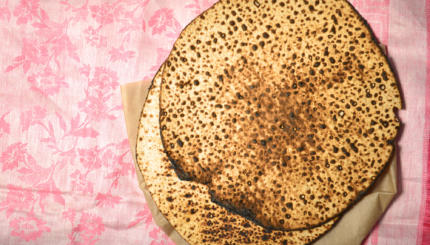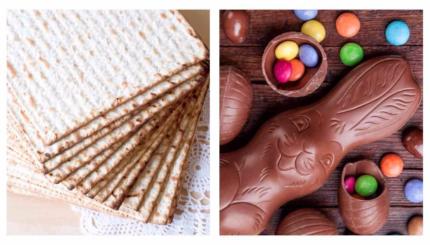Almost eight years ago, on the evening of April 22nd, after a full day of labor, my husband Rick and I got into the car and drove a mile and a half to Cedars-Sinai Hospital. Noa Tiferet Kobrin-Brody, our first child, would be born less than two hours later. Between the intensity of the contractions, Rick and I observed the beauty of the thinnest possible crescent moon that shone brightly in the deep sky. Rosh Chodesh (the beginning of a new Hebrew month) had just ended, and what we saw on that eventful evening was the first sign of the new moon. We knew it heralded an auspicious new chapter in our lives; but it also stirred a very special memory: Rick’s grandmother, who’s name was Doris, loved the crescent moon — she thought it was one of nature’s greatest beauties. Rick’s family had in fact named it a “mommy–moon” in honor of Doris.
Rick and I had been “old-school” and did not know, prior to Noa’s birth, if our baby was a boy or a girl. We had thought, if she was a girl, that we would name her Noa, after Rick’s grandfather, Nathaniel. We wanted to remember Rick’s grandmother through our child’s middle name, but we were struggling to find a suitable girl’s name that honored Doris. The crescent moon changed that. On that night in April, the crescent moon — the mommy-moon — actually had a Jewish name: Tiferet she’b’Tiferet.
Each spring, we Jews have the opportunity to usher progressively more holiness into our lives through the sacred act of counting the Omer. The 49 days between the first day of Passover and the first day of Shavuot provide a perfect square in time — seven weeks of seven days; each one gets counted as a critical step in reenacting the transformative journey from the Egyptian Exodus to the Revelation at Mt. Sinai. The mystics understood this s’firah — this period of counting — as an opportunity to contemplate 49 different combinations of 7 fundamental Divine qualities, or s’firot. Each week has one of these divine qualities connected to it, and so does each day of the week. This means that each day is a unique pairing from these 7 s’firot — the 4th day of the 2nd week, the 5th day of the 7th week, etc. Each pairing suggests a certain way of being in the world and of experiencing reality. Once each week, the same s’firah appears twice — the same number day within the same number week. This alignment offers double the power for actualizing that one quality.
Noa Tiferet was born on the 17th day of the Omer, the 3rd day of the 3rd week, Tiferet she’b’Tiferet — the day of beauty within the week of beauty. One of the beauties of the Jewish calendar is its lunar consistency, meaning that the 17th day of the Omer, Tiferet she’b’Tiferet, always falls at the first appearance of the thinnest crescent moon after Passover. Each year on Noa Tiferet’s Hebrew birthday, as we count the Omer and look up into the sky, we are greeted by that beautiful crescent shining down on us. And each year, we remember Doris Sack, a woman who lived to the full age of 93, and taught us to appreciate all of life’s beauties, especially the subtle and delicate crescent moon.



